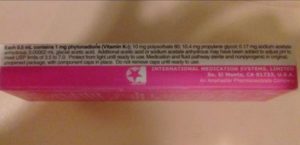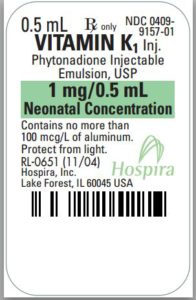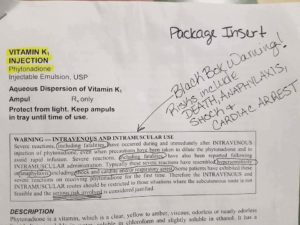“The early environment for a human infant is particularly important. In fact, the most vulnerable time for a human’s brain development in terms of environmental impact is from the period of birth and for several months after, in this fourth trimester. It is in this time that a human needs to avoid serious stressors, and it is when nurturing is so critical. There is a continued need for protection throughout childhood, of course, but the closer to the day of the, the more important affection is.”[1]
Does it make any sense to inject known neurotoxins into a baby on the first day of life? Or at 3 months? A babies’ brain is in such a critically vulnerable state at this time and needs to be protected. It is the parents most critically important role – to protect their babies’ brains. Every procedure must be evaluated in the light of the impact it could have on the very vulnerable brain.
Babies routinely receive three doses of the Hepatitis B vaccine which contains 0.25 mg aluminum as aluminum hydroxide starting on the first day of life, again at one month, and six months.

 Babies also are routinely injected with Vitamin K within hours of birth. There are two brands of vitamin K. Hospira, contains 9 mg of benzyl alcohol as preservative which damages the liver and contributes to the high frequency of infants who develop jaundice within two days of birth. The other brand, Amphastar, contains polysorbate 80 and propylene glycol. Both are seriously dangerous neurotoxins. Polysorbate is known to open the blood brain barrier and when given in conjunction with aluminum, the hazard is drastically increased.
Babies also are routinely injected with Vitamin K within hours of birth. There are two brands of vitamin K. Hospira, contains 9 mg of benzyl alcohol as preservative which damages the liver and contributes to the high frequency of infants who develop jaundice within two days of birth. The other brand, Amphastar, contains polysorbate 80 and propylene glycol. Both are seriously dangerous neurotoxins. Polysorbate is known to open the blood brain barrier and when given in conjunction with aluminum, the hazard is drastically increased.
Many researchers are now suggesting that giving mothers vitamin K in during pregnancy provides protection and is far safer than subjecting every baby to a Vitamin K shot at birth (which carries a black box warning due to risk of side effects).[2]
 In the rare circumstances when vitamin K is recommended, “oral Vitamin K is as effective as injectable Vitamin K and its usage is recommended in our country to reduce complications and costs of parenteral therapy.”[3]
In the rare circumstances when vitamin K is recommended, “oral Vitamin K is as effective as injectable Vitamin K and its usage is recommended in our country to reduce complications and costs of parenteral therapy.”[3]
Please research the risk versus benefit of ALL medical procedures recommended for your precious baby – especially in that critically important 4th Trimester – or the first 3 months of life.
Author: Becky Hastings, wife, mother, grandmother, and passionate follower of Jesus and truth. As a breastfeeding counselor for over 23 years Becky is devoted to helping parents make wise decisions for the long-term health and wellbeing of their babies. As a member of a Vaccine Safety Education Coalition, Becky writes and speaks on the topic of vaccine safety.
[1] Fallon, James. The Psychopath Inside: A Neuroscientist’s Personal Journey Into the Dark Side of the Brain, New York, NY: Penguin Group, 2013. p. 98. Print.
[2] Motohara K, Takagi S, Endo F, Kiyota Y, Matsuda I. Oral supplementation of vitamin K for pregnant women and effects on levels of plasma vitamin K and PIVKA-II in the neonate. J Pediatr Gastroenterol Nutr. 1990 Jul;11(1):32-6. https://www.ncbi.nlm.nih.gov/pubmed/2388129
[3] Malik S, et al. Comparative study of oral versus injectable vitamin K in neonates. Indian Pediatr. 1992. https://www.ncbi.nlm.nih.gov/m/pubmed/1428134/

